Computation, Language, and
Meaning
Band of Researchers
What do all of the languages of the world have in common? Why and how did these linguistic universals arise? What do they tell us about human cognition and how can we harness them to build better language technologies?
At CLMBR, we address these and related questions from a computational and experimental perspective. We are a lab hosted at the Linguistics Department of the University of Washington, as part of the larger Treehouse computational linguistics lab.
News
On sabbatical in Fall 2025 and Spring 2026. Taking on fewer students, review requests, and the like this year.
Updated papers from 2025 and January 2026. The rest of the website (e.g. recent alumni / theses) will follow before too long :). [January 2026]
Upcoming invited talks:
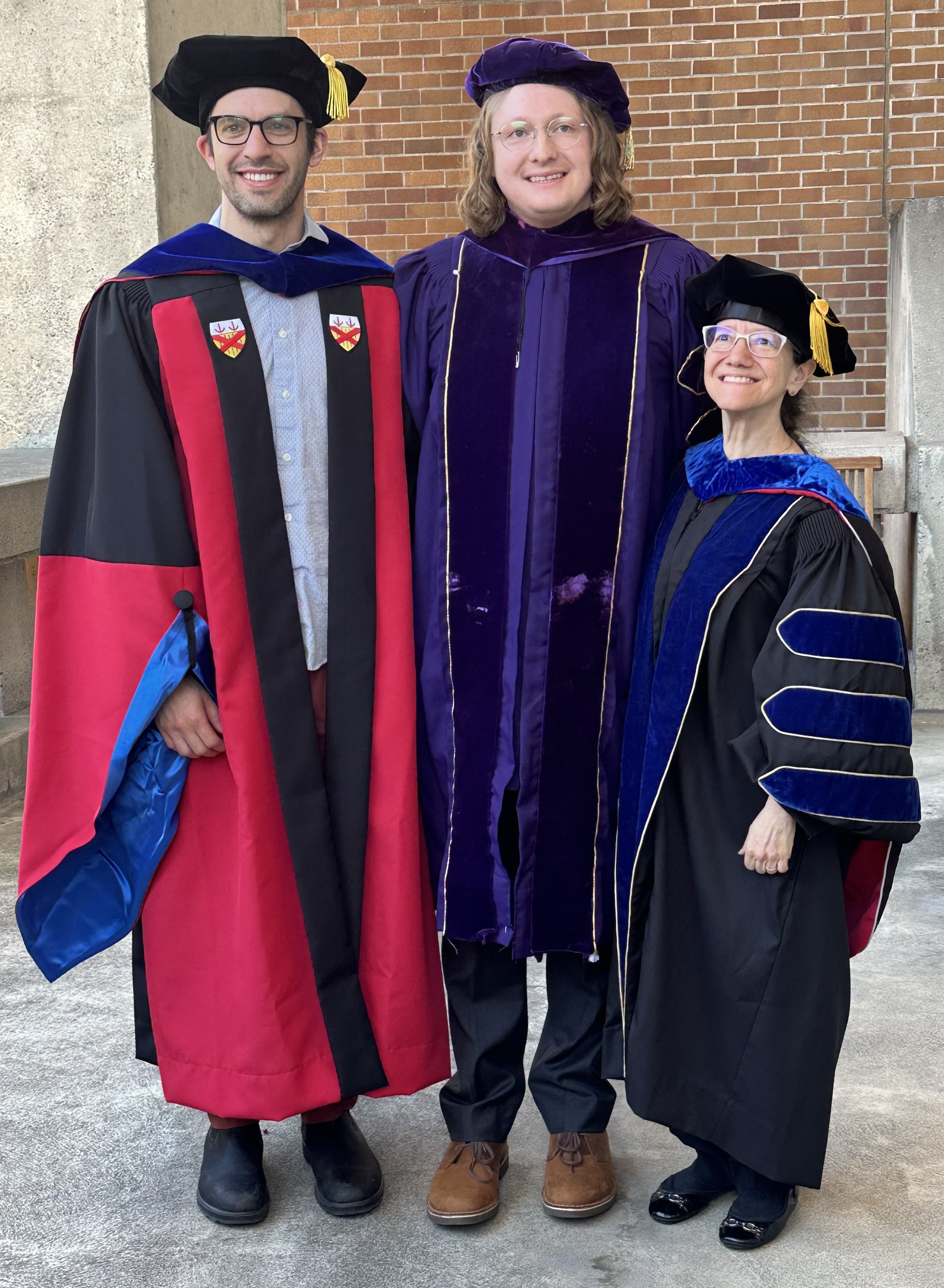
- Northeastern University Philosophy and Technology Colloquium (September 2025)
- Georgetown University Linguistics Colloquium (October 2025)
Filtered Corpus Training paper accepted at TACL; congratulations to Abhinav and the whole team! Some other new papers also updated below. [September 2024]
Congratulations to Dr. C.M. Downey, who will be starting as an Assistant Professor of Linguistics and Data Science at the University of Rochester this Fall! [February / June 2024]
Upcoming invited talks:
- 9th CSLI Workshop on Logic, Rationality and Intelligent Interaction (June 2024)
- North East Linguistics Society (NELS55; October 2024)
- Workshop on AI and cognitive science (Götegorb; November 2024)
- Workshop on self-assembling games (Irvine; January 2025)
Tenured! 🤗 Very grateful for all the wonderful mentors and students who have helped along the way. [April 2024]
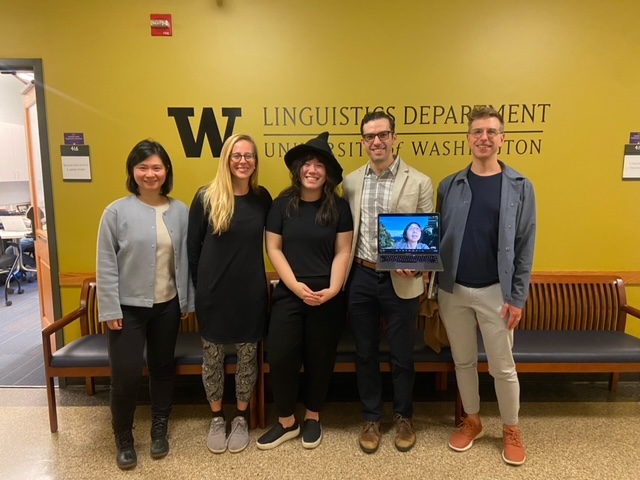
Congratulations to the brilliant Dr. Naomi Tachikawa Shapiro for successfully defending her dissertation (the first in the group)! Naomi is now off to a postdoc in computational psycholinguistics at Nijmegen! [Dec 2023]
Five papers accepted at various EMNLP Workshops; congratulations to everyone involved! [Oct 2023]
- Evaluating Transformer's Ability to Learn Mildly Context-Sensitive Languages at BlackboxNLP
- Embedding structure matters: Comparing methods to adapt multilingual vocabularies to new languages at Multilingual Representation Learning (MRL): this also won the best paper award!
- Learning to translate by learning to communicate at Multilingual Representation Learning (MRL)
- Two papers (to appear soon) contributing to the Collaborative Benchmarking Task at the GenBench workshop on generalisation in NLP
Upcoming invited talks:
- Workshop on internal and external pressures shaping language @ ESSLLI 2023
- Ohio State Linguistics Colloquium (Sept 2023)
- Workshop on computational approaches to language typology and evolution (Oct 2023)
- UMass Amherst Linguistics Colloquium (Dec 2023)
- University of Edinburgh Center for Langauge Evolution (Winter 2024)
Congratulations to everyone who graduated in Spring 2023! CLMSer Yifan Jiang is off to a PhD in CS at Waterloo! Our first batch of undergrads has also graduated: Minghe Zhang is off to an MS in Stats at STanford and we are lucky to have Leroy Wang and Gladys Wang staying on board for the CLMS program. Congratulations everyone!
Several new papers and preprints posted [February 2023]
Upcoming invited talks:
- McDonnell Foundation workshop on monotonicity @ Brown (Dec 2022)
- UC Irvine Language Science Colloquium (Feb 2023)
- MIT Breakstone Speaker Series on Language, Mind and Computation (March 2023)
- UC Davis Linguistics Colloquium (May 2023)
Two papers accepted at BlackboxNLP! [October 2022]
Emergent Communication Fine-tuning (EC-FT) for Pretrained Language Models gets runner-up best paper at the Emergent Communication Workshop @ ICLR! [April 2022]
Invited talks at Ettinger lab @ U Chicago and CLASP @ Gothenburg [March 2022]
Two ACL papers and a SALT paper accepted! [February 2022]
Added several publications and preprints from the second half of 2021. [January 2022]
Two new papers! [May 2021]
- "Language models use monotonicity to assess NPI licensing" at Findings of ACL, with Jaap Jumelet, Milica Denic, Jakub Szymanik, Dieuwke Hupkes
- "Quantifiers satisfying semantic universals are simpler" at CogSci 2021, with Iris van de Pol, Paul Lodder, Leendert van Maanen, Jakub Szymanik
Three new preprints posted! See the Publications section below for more info and links. (April 2021)
"Referential and General Calls in Primate Semantics" published in Linguistics and Philosophy
Invited talks at TedLab@MIT (May 2021) and Montana State Computer Science Colloquium (Feb 2021)
Two papers and an extended abstract accepted at BlackboxNLP! (September 2020)
- "Probing for Multilingual Numerical Understanding in Transformer-Based Language Models" by Devin Johnson, Denise Mak, Drew Barker, and Lexi Loessberg-Zahl
- "Linguistically-Informed Transformations (LIT): A Method for Automatically Generating Contrast Sets" by Chuanrong Li, Lin Shengshuo, Zeyu Liu, Xinyi Wu, Xuhui Zhou, and Shane Steinert-Threlkeld
- "Mighty Morpho-Probing Models" (extended abstract) by Naomi Tachikawa Shapiro, Amandalynne Paullada, and Shane Steinert-Threlkeld
Invited talks at Human Interactivity and Language Lab (June 2020) and the Computation and Language Lab (October 2020)
Shane is co-organizing a workshop on Computational
and Experimental Explanations in Semantics and Pragmatics, co-located with ESSLLI (August 2020 2021)
Daniel is co-organizing a track on deep learning in search at NIST's TREC 2020 (Nov 2020)
"On the Spontaneous Emergence of Discrete and Compositional Singals" (with Nur Lan and Emmanuel Chemla) accepted at ACL; preprint available soon (April 2020)
"Complexity/informativeness trade-off in the domain of indefinite pronouns"
presented at Semantics and Linguistic Theory (SALT 30) (April August 2020)
Semantic Expressivism for Epistemic Modals appears online at Linguistics and Philosophy (March 2020)
Invited talk at Language Change: Theoretical and Experimental Perspectives at the
Hebrew Univeristy of Jerusalem (March 2020 January 2021)
Most, but not more than half is proportion-dependent and sensitive to individual differences appears in the proceedings of Sinn und Bedeutung (SuB 24) (February 2020)
Daniel is teaching Deep Learning in Search at ACM SIGIR/SIGKDD Africa Summer School on Machine Learning for Data Mining and Search (January 2020)
"Quantifiers in natural language optimize the simplicity/informativeness trade-off" presented at the 22nd Amsterdam Colloquium (December 2019)
"An Explanation of the Veridical Uniformity Universal" appears online at Journal of Semantics (open access) (December 2019)
"Ease of Learning Explains Semantic Universals" appears online at Cognition (November 2019)
"Learnability and Semantic Universals" appears online at Semantics & Pragmatics (November 2019)
"Towards the Emergence of Non-trivial Compositionality" accepted at Philosophy of Science (September 2019)
Shane presents two papers—"The evolution of monotone quantifiers via iterated learning" and Complexity and learnability in the explanation of semantic universals"—at CogSci (July 2019)
Lewis presents Neural Models of the Psychosemantics of "most" at Cognitive Modeling and Computational Linguistics (CMCL) (June 2019)
Research
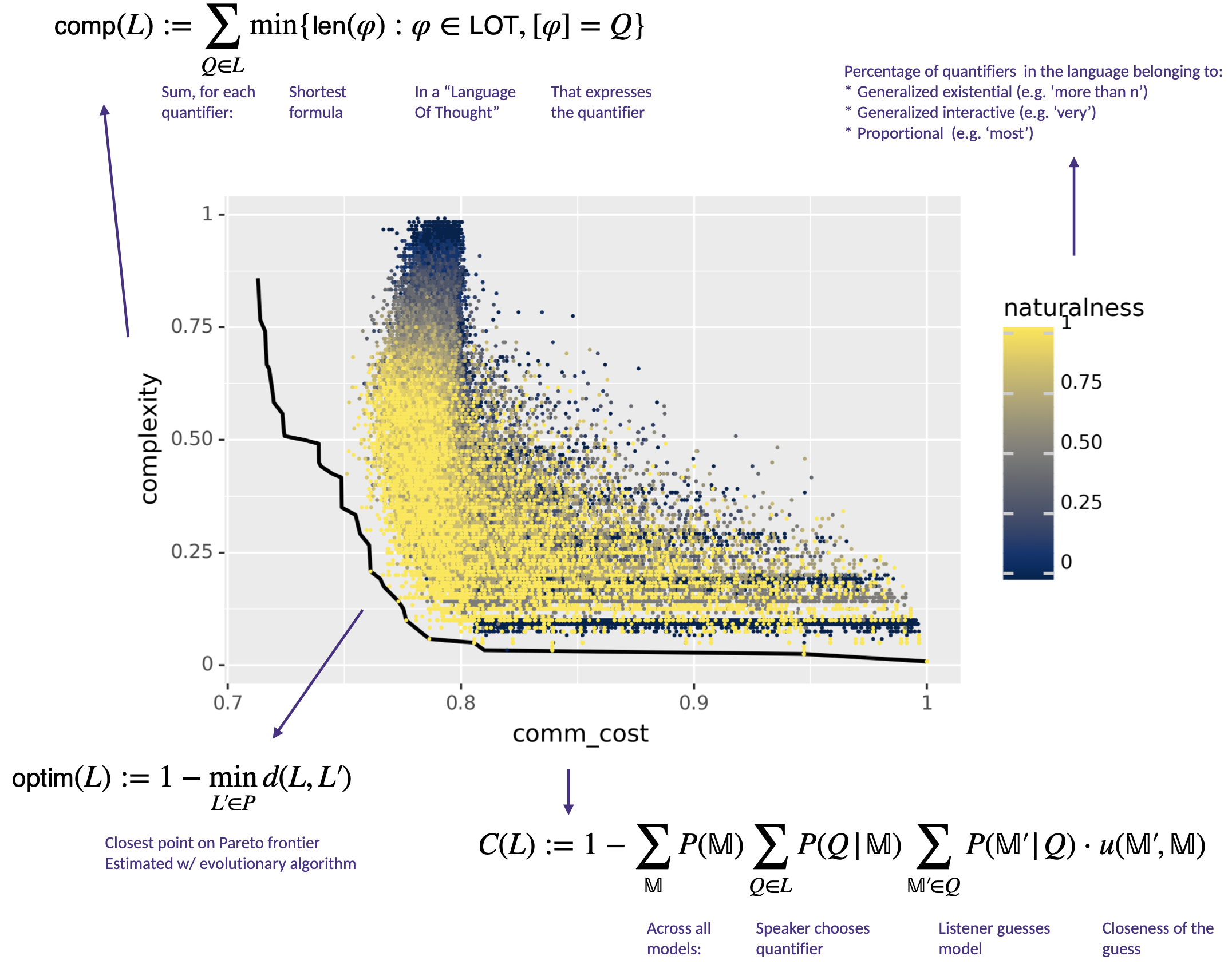
Semantic Universals
A major line of recent work has involved explaining semantic universals: shared properties of meaning across all natural languages. We have been using machine learning to argue that the languages of the world express meanings that are easier to learn. Ongoing work extends this approach to more linguistic domains, compares it to other candidate explanations, and integrates learnability with models of language change/evolution.
Representative papers:
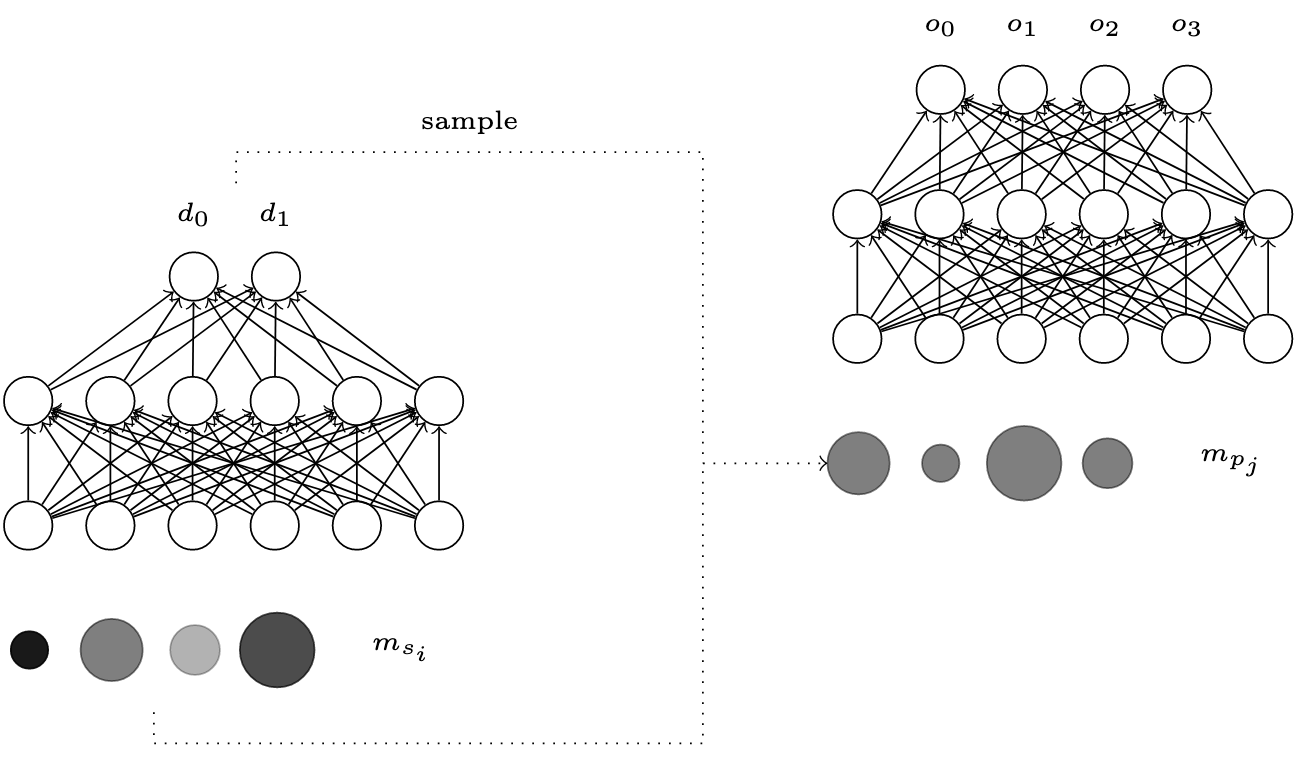
Emergent Communication
By placing artificial agents in simulated environments, we can use reinforcement learning to study the emergence of fundamental features of human language. A particular focus has been on non-trivial compositionality: rudimentary forms of hierarchical structure that exhibit one linguistic item modifying another, as in non-intersective adjectives. This research line has both theoretical and practical interest, since autonomous agents such as vehicles may benefit from learning their own communication system.
Representative papers:
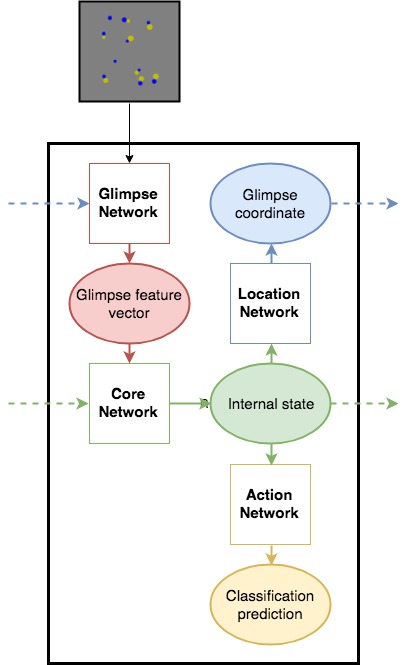
Cognitive Science and NLP
We also conduct studies investigating the cognitive underpinnings of language understanding. How do speakers represent meanings internally and how do these representations interface with other cognitive modules?
Moreover, as natural language processing tools become increasingly more powerful, we believe that two-way interaction between cognitive science and NLP will be increasingly important. On the one hand: insights from human language understanding can help us analyze, understand, and build better machines. On the other hand: increasing sophistication in modeling from NLP can provide inspiration and insights in modeling human behavior. Our lab has ongoing projects in both directions.
Representative papers:
People
Principal Investigator

Shane Steinert-Threlkeld
Assistant Professor, Linguistics
Personal Website
shanest AT uw DOT edu
Shane is an Associate Professor in Linguistics, where he directs the CLMBR group and teaches in the CLMS program. When not researching or teaching, he spends as much time as possible climbing rocks.
Graduate Students

Danielle Celone
Master's Student in Computational Linguistics
dcelon AT uw DOT edu
Danielle’s research applies techniques from computational linguistics to non-human animal communication systems. She's interested in formal language theory, bioacoustics, syntax, and semantics. She likes movies, birdwatching, science fiction, and road trips.
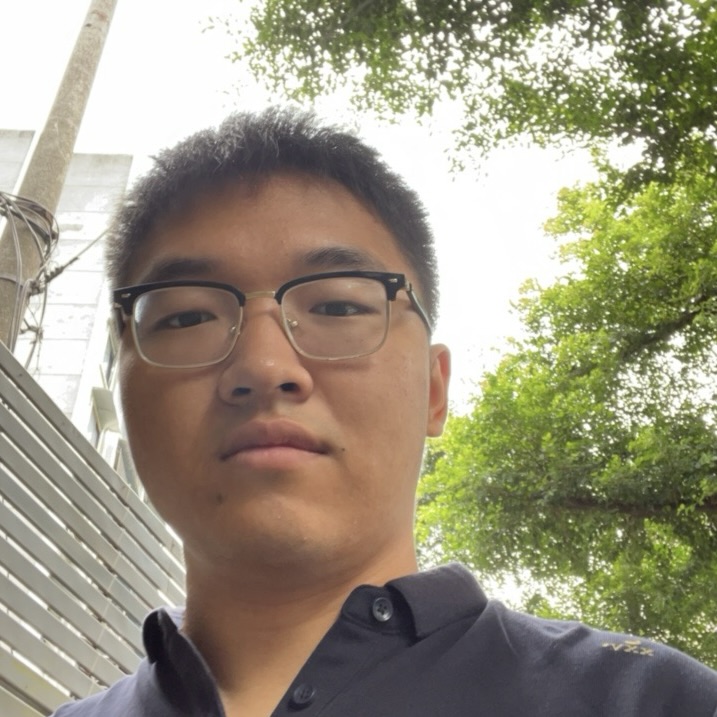
Iskar Deng
Master's Student in Computational Linguistics
hd49 AT uw DOT edu
Iskar is interested in cognitive differences between humans and language models, especially in typological patterns. In his free time, he enjoys playing baseball and following the Seattle Mariners.
Chris Haberland
PhD Student in Computational Linguistics
Personal Website
haberc_ATT uw_DOTT [educ. abbrev.]
Chris studies multimodal language models and natural languages through controlled computational experiments. He is interested in advancing reinforcement learning techniques to emulate language evolution, acquisition, and processing. Chris is also working to build NLP resources for Italic and Mexican languages.

Jiamu Luo
Master's Student in Computational Linguistics
jiamuluo AT uw DOT edu
Jiamu's overarching research question is how language models correspond to human language systems. He is also interested in developing more human-comparable models for that purpose. In his free time, he can be found brewing coffee, playing badminton, or watching musicals.

Cassie Maz
PhD Student in Computational Linguistics
Personal Website
cassam5 AT uw DOT edu
Cassie's main research interest is the demand for and development of sign langauge translation tools. Outside of research, she enjoys watching TV and the Sisyphean task of finishing books on her evergrowing reading list.

Amanda Popadich
PhD Student in Computational Linguistics
popadich AT uw DOT edu
Amanda's work explores how humans and language models process ambiguous language and make inferences. She uses methods from experimental pragmatics and machine learning. Outside of research, she can usually be found skiing or hiking.
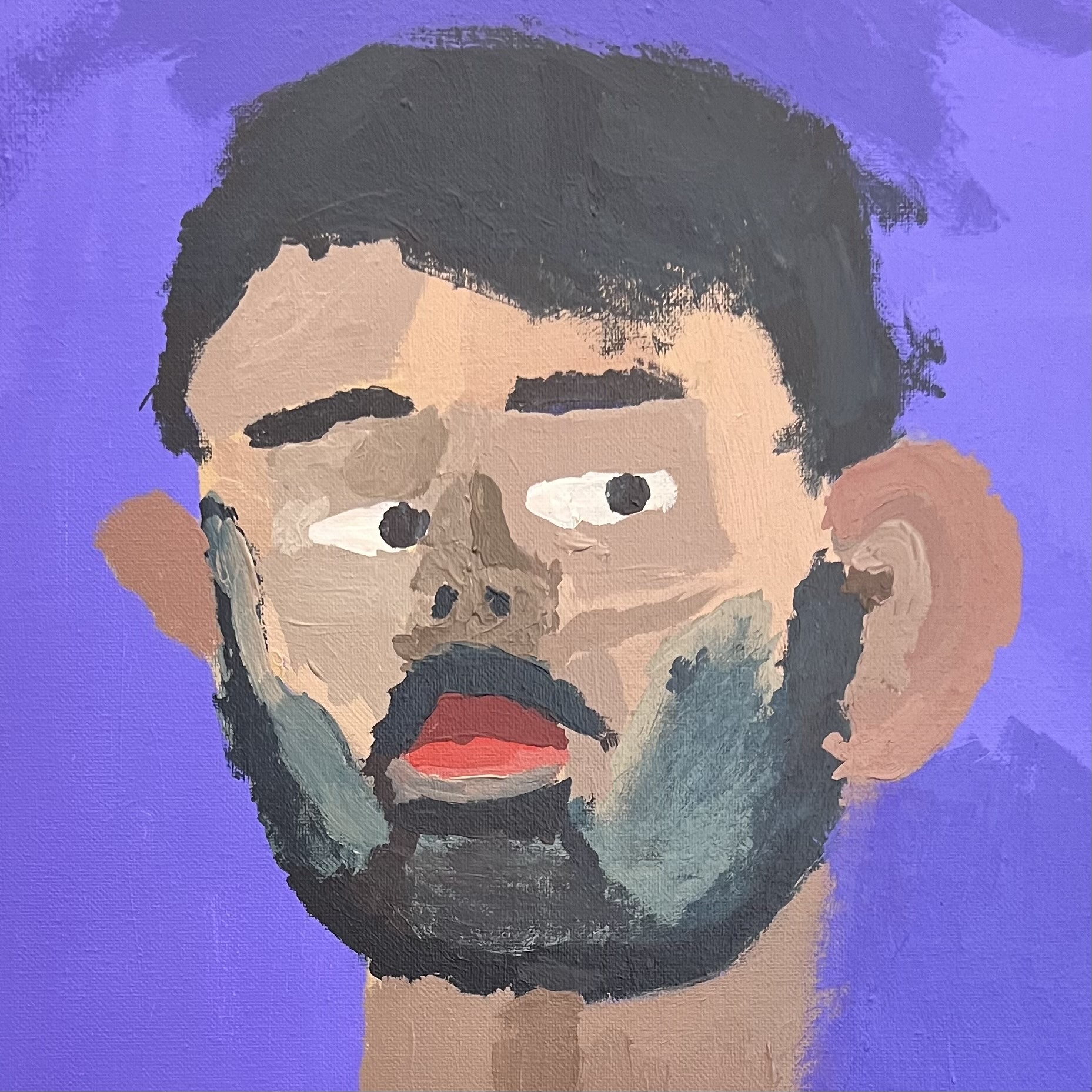
Jingnong Qu
PhD Student in Computational Linguistics
Personal Website
jingnong AT uw DOT edu
Jingnong is interested in applying computational methods to studying natural language semantics. He enjoys visual arts, music, driving, and comedy outside of his research. His image is his first attempt at a self-portrait.
Undergraduate Students
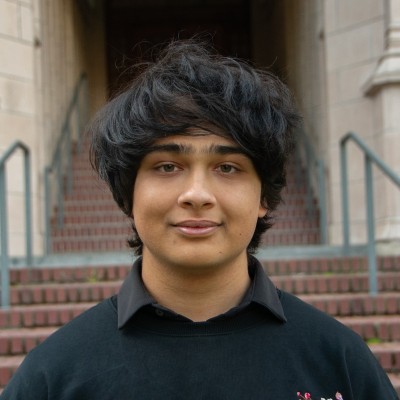
Ashvin Ranjan
Undergraduate Student in Computer Science, Minor in Linguistics & Japanese
ar31 AT uw DOT edu
Ashvin's work focuses a variety of topics in computational linguistics, from Information theory to machine learning architecture and large-scale text processing. Aside from research, he enjoys photography, listening to music, and video games.
Alumni
PhD
- Naomi Tachikawa Shapiro (first job: Postdoc in Computational Psycholinguistics @ Nijmegen)
- C.M. Downey (first job: Assistant Professor of Linguistics and Data Science @ University of Rochester)
M.S. Thesis Students
-
Daniel Campos (PhD student in CS @ UIUC)
CLMS Thesis: Explorations In Curriculum Learning Methods For Training Language Models -
Paige Finkelstein (Software Engineer @
turn.io)
CLMS Thesis: Human-assisted Neural Machine Translation: Harnessing Human Feedback for Machine Translation -
Benny Longwill (Research Engineer @ ETS)
CLMS Thesis: The Suitability of Generative Adversarial Training for BERT Natural Language Generation -
Chih-chan Tien (PhD student in CS @ U Chicago)
CLMS Thesis: Bilingual alignment transfers to multilingual alignment for unsupervised parallel text mining -
Devin Johnson (PhD student in Linguistics @
Northwestern)
CLMS Thesis: Semantic Universals in Bayesian Learning of Quantifiers -
Wes Rose (Language Engineer @
Amazon)
CLMS Thesis: Toward the Emergence of Quantifiers -
Shunjie Wang (Data Scientist,
AI/NLP @ Happify Health)
CLMS Thesis: Evaluating Transformer's Ability to Learn Mildly Context-Sensitive Languages -
Jessica Sweeney
(Data Scientist @ Coastal Community Bank)
CLMS Thesis: Comparing Methods for Automatic Identification of Mislabeled Data -
Megan Barnes (Software Engineer @ Google)
MS Thesis: Latent Compositional Representations for English Function Word Comprehension -
Katya Simpson (Senior Data Scientist @ Twitter)
CLMS Thesis: "Obama never said that": Evaluating fact-checks for topical consistency and quality -
Nathaniel Imel (PhD student, Logic and
Philosophy of Science @ UC Irvine)
CLMS Thesis: Modals in Natural Language Optimize the Simplicity/Informativeness Trade-Off -
Meheresh Yeditha (Software Engineer @ Rippling)
CLMS Thesis: An Investigation Into Supervision for Seq2Seq Techniques for Natural Language to Code Translation -
Yifan Jiang (PhD student, Computer Science @ Waterloo)
CLMS Thesis: The Weighted Mobius Score: A Unified Framework for Feature Attribution -
Abhinav Patil (PhD student, Cognitive Science @ The Johns Hopkins University)
CLMS Thesis: Language Models can Generalize from Indirect Evidence: Evidence from Filtered Corpus Training (FICT) -
Lindsay Paige Skinner
CLMS Thesis: Convexity is a Fundamental Feature of Efficient Semantic Compression in Probability Spaces -
Amélie Thu Tâm Reymond
CLMS Thesis: mSCAN - a Multilingual Dataset for Compositional Generalization Evaluation -
Leroy Wang
CLMS Thesis: Complexity of In-Context Concept Learning in Language Models -
Yao-Fei Cheng (AI Resident @ Apple)
CLMS Thesis: Beyond Memorization: Evaluating Length-Generalization in Transformer-based Language Models -
Dwija Parikh (Linguistic Engineer @ Meta)
CLMS Thesis: Bridging the Gap: Adaptation Approaches for Under-Resourced Language Families
Publications
Preprints
Differences in Typological Alignment in Language Models' Treatment of Differential Argument Marking
Iskar Deng, Nathalia Xu, Shane Steinert-Threlkeld
preprint
When Efficient Communication Explains Convexity
Ashvin Ranjan, Shane Steinert-Threlkeld
preprint
Deontic priority in the lexicalization of
impossibility modals
Wataru Uegaki, Anne Mucha, Nathaniel Imel, Shane Steinert-Threlkeld
preprint
2026
An Efficient Communication Analysis of Modal Typology
Nathaniel Imel, Qingxia Guo, Shane Steinert-Threlkeld
Open Mind
official
preprint
Anti-Babel: Three Degrees of Interspecies Comprehension
Philippe Schlenker, Camille Coye, Ambre Salis, Shane Steinert-Threlkeld, Lucie Ravaux, Emmanuel Chemla
Mind & Language
official
preprint
2025
Ancestral Meanings: A Prelude to Evolutionary Animal Linguistics
Philippe Schlenker, Christina Pawlowitsch, Luc H. Arnal, Keny Chatain, Lucie Ravaux, Robin Ryder, Ambre Salis, Shane Steinert-Threlkeld, Léo Wang, Emmanuel Chemla
Linguistics and Philosophy, 48(5): 823–878
official
preprint
Second-Order Zipf's Law for Word Co-Occurrences
Nicolas Guerin, Shane Steinert-Threlkeld, Robin J. Ryder, Emmanuel Chemla
Open Mind, 9: 1138–1157
official
The Unnatural Language ToolKit (ULTK)
Nathaniel Imel, Christopher Haberland, Shane Steinert-Threlkeld
Society for Computation in Linguistics (SCiL), vol. 8, no. 1
official
Minimization of Boolean Complexity in In-Context Concept Learning
Leroy Z. Wang, R. Thomas McCoy, Shane Steinert-Threlkeld
CogInterp: Interpreting Cognition in Deep Learning Models
official
Quantifiers That Are More Monotone Are Easier to Learn
Christopher Haberland, Shane Steinert-Threlkeld
Semantics and Linguistic Theory (SALT 35)
2024
Filtered Corpus Training (FiCT) Shows that Language Models can Generalize from Indirect Evidence
Abhinav Patil, Jaap Jumelet, Yu Ying Chiu, Andy Lapastora, Peter Shen, Lexie Wang, Clevis Willrich, Shane Steinert-Threlkeld
Transactions of the Association for Computational Linguistics (TACL)
official
preprint
Targeted Multilingual Adaptation for Low-resource Language Families
C.M. Downey, Terra Blevins, Dhwani Serai, Dwija Parikh, Shane Steinert-Threlkeld
Findings of EMNLP
official
preprint
The Impact of Syntactic and Semantic Proximity on Machine Translation with Back-Translation
Nicolas Guerin, Emmanuel Chemla, Shane Steinert-Threlkeld
Transactions on Machine Learning Research (TMLR)
official
preprint
Iconic Artificial Language Learning in the Field: An Experiment with San Martín Peras Mixtec Speakers
Naomi Tachikawa Shapiro, Andrew Hedding, Shane Steinert-Threlkeld
CogSci
official
Minimal Compositionality versus Bird Implicatures: Two Theories of ABC-D Sequences in Japanese Tits
Philippe Schlenker, Ambre Salis, Maël Leroux, Camille Coye, Luigi Rizzi, Shane Steinert-Threlkeld, Emmanuel Chemla
Biological Reviews
official
preprint
Limitations of a modal analysis of before and after
Toshiyuki Ogihara, Shane Steinert-Threlkeld
Semantics & Pragmatics
official
2023
Learning to translate by learning to communicate
C.M. Downey, Leo Z. Liu, Xuhui Zhou, Shane Steinert-Threlkeld
Multilingual Representation Learning (MRL 2023)
official
preprint
code
Embedding structure matters: Comparing methods to adapt multilingual vocabularies to new languages
C.M. Downey, Terra Blevins, Nora Goldfine, Shane Steinert-Threlkeld
Multilingual Representation Learning (MRL 2023), best paper award
official
preprint
Evaluating Transformer's Ability to Learn Mildly Context-Sensitive Languages
Shunjie Wang, Shane Steinert-Threlkeld
BlackboxNLP
official
preprint
mSCAN: A Dataset for Multilingual Compositional Generalisation Evaluation
Amelie Raymond, Shane Steinert-Threlkeld
GenBench Workshop
official
GQG: Generalized Quantifier Generalization - A Dataset for Evaluating Quantifier Semantics Understanding in Language Models
Leroy Zhifei Wang, Shane Steinert-Threlkeld
GenBench Workshop
official
Iconic Artificial Language Learning: A Conceptual Replication with English Speakers
Naomi Tachikawa Shapiro, Shane Steinert-Threlkeld
CogSci
official
preprint
A Semantic Universal for Modality
Shane Steinert-Threlkeld, Nathaniel Imel, Qingxia Guo
Semantics & Pragmatics
official
preprint
Quantifiers Satisfying
Semantic Universals Have Shorter Minimal Description Length
Iris van de Pol, Paul Lodder, Leendert van Maanen, Shane Steinert-Threlkeld, Jakub
Szymanik
Cognition
official
code
Uncovering the structure of semantic
representations using a computational model of decision-making
Sonia Ramotowska, Shane Steinert-Threlkeld, Leendert Van Maanen, Jakub Szymanik
Cognitive Science
official
code + data
2022
Probing for Understanding of
English Verb Classes and Alternations in Large Pre-trained Language Models
David K. Yi, James V. Bruno, Jiayu Han, Peter Zukerman, Shane Steinert-Threlkeld
BlackboxNLP
official preprint
code
Testing Pre-trained Language
Models' Understanding of Distributivity via Causal Mediation Analysis
Pangbo Ban, Yifan Jiang, Tianran Liu, Shane Steinert-Threlkeld
BlackboxNLP
official preprint
code
Beyond Anthropocentrism in Comparative
Cognition: Recentering Animal Linguistics
Philippe Schlenker, Camille Coye, Shane Steinert-Threlkeld, Nathan Klinedinst, Emmanuel
Chemla
Cognitive Science
official preprint
Modals semantic universals optimize the
simplicity/informativeness trade-off
Nathaniel Imel, Shane Steinert-Threlkeld
SALT
official
preprint
code
A Database for Modal Semantic
Typology
Qingxia Guo, Nathaniel Imel, Shane Steinert-Threlkeld
SIGTYP
official website
A Masked Segmental Language
Model for Unsupervised Natural Language Segmentation
C.M. Downey, Fei Xia, Gina-Anne Levow, Shane Steinert-Threlkeld
SIGMORPHON
official preprint
code
Indefinite pronouns optimize the
simplicity/informativeness trade-off
Milica Denić, Shane Steinert-Threlkeld, Jakub Szymanik
Cognitive Science
official preprint
code
Emergent Communication Fine-tuning
(EC-FT) for Pretrained Language Models
Shane Steinert-Threlkeld, Xuhui Zhou, Zeyu Liu, C.M. Downey
Emergent Communication Workshop (EmeCom 5) @ ICLR
Runner-up best paper award
official
code
Bilingual alignment transfers to multilingual
alignment for unsupervised parallel text mining
Chih-chan Tien, Shane Steinert-Threlkeld
ACL
official preprint
code
Multilingual unsupervised sequence
segmentation transfers to extremely low-resource languages
C.M. Downey, Shannon Drizin, Levon Haroutunian, Shivin Thukral
ACL
official
preprint
code
Explaining semantic typology, forms
and all
Shane Steinert-Threlkeld
Trends in Cognitive Sciences
official
2021
Quantifiers in Natural Language: Efficient
Communication and Degrees of Semantic Universals
Shane Steinert-Threlkeld
Entropy
official (open
access) code
A multilabel approach to
morphosyntactic probing
Naomi Tachikawa Shapiro, Amandalynne Paullada, Shane Steinert-Threlkeld
Findings of EMNLP
official preprint
code
Monotone Quantifiers Emerge via Iterated
Learning
Fausto Carcassi, Shane Steinert-Threlkeld, Jakub Szymanik
Cognitive Science
official (open
access) preprint code
Language Models Use
Monotonicity to Assess NPI Licensing
Jaap Jumelet, Milica Denic, Jakub Szymanik, Dieuwke Hupkes, Shane Steinert-Threlkeld
Findings of ACL
official preprint code
Quantifiers satisfying semantic
universals are simpler
Iris van de Pol, Paul Lodder, Leendert van Maanen, Shane Steinert-Threlkeld, Jakub
Szymanik
CogSci 2021
official preprint
code
How social networks affect the
repression-dissent puzzle
Shane Steinert-Threlkeld, Zachary Steinert-Threlkeld
PLoS One
official (open access) code
Referential and General Calls
in
Primate Semantics
Shane Steinert-Threlkeld, Philippe Schlenker, Emmanuel Chemla
Linguistics and Philosophy
official preprint
code
2020
Linguistically-Informed Transformations
(LIT): A
Method for Automatically Generating Contrast Sets
Chuanrong Li, Lin Shengshuo, Zeyu Liu, Xinyi Wu, Xuhui Zhou, and Shane
Steinert-Threlkeld,
BlackboxNLP
official
preprint
code
Probing for Multilingual Numerical
Understanding in
Transformer-Based Language Models
Devin Johnson, Denise Mak, Drew Barker, and Lexi Loessberg-Zahl,
BlackboxNLP
official
preprint
code
Ease of
Learning
Explains Semantic Universals
Shane Steinert-Threlkeld and Jakub Szymanik,
Cognition, vol 195, no. XX, pp. XX.
official preprint code
On the Spontaneous
Emergence of
Discrete and Compositional Singals
Nur Lan, Emmanuel Chemla, Shane Steinert-Threlkeld, Proceedings of the Association for Computational Linguistics (ACL)
official preprint code
Complexity/informativeness
trade-off in the domain of indefinite pronouns
Milica Denic, Shane Steinert-Threlkeld, Jakub Szymanik, Proceedings of Semantics and Linguistic Theory (SALT 30)
official
preprint code
Semantic
Expressivism for Epistemic Modals
Peter Hawke and Shane Steinert-Threlkeld (alphabetical order),
Linguistics and Philosophy, forthcoming.
official (open
access)
preprint
Most,
but not more than half is proportion-dependent and sensitive to individual
differences
Sonia Ramotowska, Shane Steinert-Threlkeld, Leendert van Maanen, Jakub Szymanik,
Proceedings
of Sinn und Bedeutung (SuB 24)
official
preprint
Towards the Emergence of Non-trivial
Compositionality
Shane Steinert-Threlkeld,
Philosophy of Science, forthcoming.
official
preprint
code
An
Explanation of the Veridical Uniformity Universal
Shane Steinert-Threlkeld
Journal of Semantics, vol 37 no 1, pp.
129-144.
official (open
access) preprint code
2019
Quantifiers
in
natural language optimize the simplicity/informativeness trade-off
Shane Steinert-Threlkeld, Proceedings of the 22nd
Amsterdam
Colloquium, eds. Julian J. Schlöder, Dean McHugh & Floris
Roelofsen, pp. 513-522.
official preprint code
poster
Learnability
and Semantic Universals
Shane Steinert-Threlkeld and Jakub Szymanik, Semantics &
Pragmatics, vol 12 issue 4.
early access
code
The emergence of monotone quantifiers via iterated
learning
Fausto Carcassi, Shane Steinert-Threlkeld (co-first), and Jakub Szymanik,
Proceedings of the
41st Annual Meeting of the Cognitive Science Society
(CogSci
2019).
preprint code
Complexity and learnability in the explanation of
semantic
universals
Iris van de Pol, Shane Steinert-Threlkeld, and Jakub Szymanik, Proceedings of the
41st
Annual Meeting of the Cognitive Science Society (CogSci
2019).
preprint code
Neural Models of the
Psychosemantics of
"Most"
Lewis O'Sullivan and Shane Steinert-Threlkeld, Proceedings of the 9th Workshop on Cognitive Modeling and Computational
Linguistics
(CMCL2019).
official poster code
2018
Paying Attention to Function Words
Shane Steinert-Threlkeld, Emergent Communication Workshop @ 32nd Conference on Neural Information Processing Systems (NeurIPS
2018).
paper poster code
Some of them can Be Guessed! Exploring
the
Effect of Linguistic Context in Predicting Quantifiers
Sandro Pezzelle, Shane Steinert-Threlkeld, Raffaella Bernardi, Jakub Szymanik,
Proceedings
of the 56th Annual Meeting of the Association for
Computational
Linguistics (ACL 2018).
official code
Informational Dynamics of
Epistemic
Possibility Modals
Peter Hawke and Shane Steinert-Threlkeld
Synthese, vol 195 no 10,
pp. 4309-4342.
official
2016
Compositional Signaling in a Complex
World
Shane Steinert-Threlkeld, Journal of Logic, Language, and
Information, vol 25 no 3, pp. 379-397.
official
code
Compositionality and Competition in
Monkey
Alert Calls
Shane Steinert-Threlkeld
Theoretical Linguistics, vol 42 no 1-2,
pp. 159-171.
official local
Currently Dormant
The Weighted Möbius Score: A Unified Framework for Feature Attribution
Yifan Jiang, Shane Steinert-Threlkeld
preprint
Learning Compositional Negation in
Populations of
Roth-Erev and Neural Agents
Graham Todd, Shane Steinert-Threlkeld, Christopher Potts
preprint
Resources
ULTK: The Unnatural Language Toolkit: this is a Python library (in very active development) to facilitate research using unnatural languages, especially in semantic typology. Current tools focus on efficient communication and grammars for expressions in a language-of-thought.
lm-training: a skeleton for config-driven training of language models on your own data, using HuggingFace. Includes the ability to use HF's Trainer to train recurrent models in addition to transformers.
The Modal Typology Database: a database recording observations about the semantic typology of modals in natural language, focusing on the force-flavor pairs that they can express. This is a growing resource, designed to be easy to contribute to, so please consider so doing!
edugrad: a minimal re-implementation of the PyTorch API for building dynamic computation graphs and computing gradients via backpropagation, designed for pedagogical purposes.